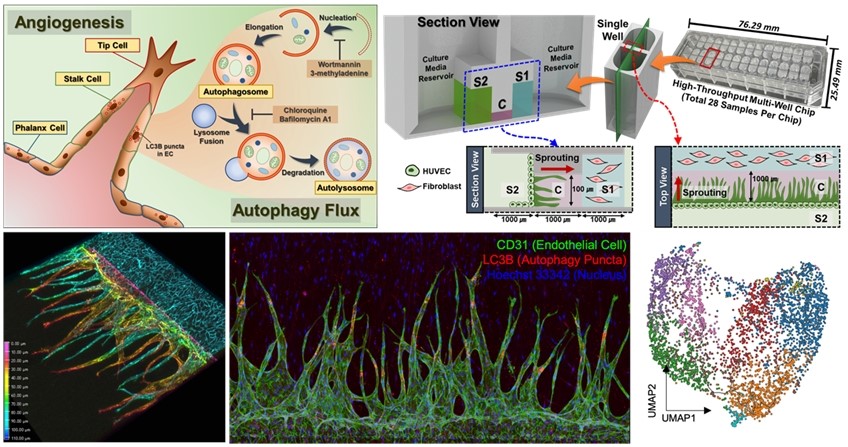Research News
[Prof. Noo Li Jeon] Selective control mechanism of autophagy during angiogenesis based on the fusion of organ-on-a-chip technol
Author
김민아
Date
2024-05-02
Views
827
[Research Need]
Autophagy is a phenomenon in which cells destroy unnecessary or cellular components by self-digestion. Although research on the specific functions of autophagy in various types of cells is active, it has not yet been clearly elucidated what role autophagy plays in the process of angiogenesis. Therefore, research on the role of autophagy in vascular cells is actively underway to elucidate the relationship between autophagy and angiogenesis. However, existing traditional 2D vascular cell culture methods do not reflect the actual in vivo 3D vascular neogenesis characteristics. Because the heterogeneity of vascular cells was not reflected in two-dimensional culture, clear mechanistic studies on the role of autophagy were not possible. Furthermore, for genomic analysis for mechanistic studies, a 3D culture model with high reproducibility and high sample acquisition rate is needed. Therefore, we aim to elucidate the specific role of autophagy in vascular neogenesis by integrating off-chip technology-based 3D vascular neogenesis model technology and sequencing technology.
[Research Results/Expected Effects]
The research team utilized a three-dimensional vascular organ-on-a-chip to elucidate the role of autophagy in the process of vascular neogenesis. In particular, by utilizing the advantage of the organ-on-a-chip, which can produce a large amount of three-dimensional vascular samples, various autophagy inhibitors could be rapidly screened. In addition, by incorporating single-cell RNA sequencing techniques, they identified which genes are involved in autophagy processes in blood vessels. This study is a case of integrating three-dimensional in vitro model technology and genetic sequencing technology, demonstrating that biological mechanistic research is possible using in vitro models that function similarly to in vivo models. The results of this study imply that regulating autophagy may be a new approach for inhibiting vascular neogenesis, which can be used as a treatment method for many diseases, including cancer. In particular, we can expect a synergistic effect of autophagy and vascular neogenesis regulation in cancer treatment.
[Main Text]
The research team led by Professor Jeon Nuri of the Department of Mechanical Engineering at Seoul National University, in collaboration with Seoul National University researches (Professors Baek Seong-hee and Hwang Dae-hee) and Pohang University of Science and Technology (Professor Kim Jong-gyeong), announced that they have elucidated the selective control mechanism of autophagy in vascular neogenesis by introducing off-chip technology and single-cell RNA sequencing technology.
Autophagy is a phenomenon in which cells self-digest unnecessary or cellular components, and research on various physiological and pathological roles of autophagy is actively underway. New blood vessels are created depending on the surrounding environment and pathological conditions in the vascular network, a process called angiogenesis, which involves vigorous proliferation, differentiation, and movement of endothelial cells. Although research on autophagy in vascular cells is actively conducted, its role in the process of vascular neogenesis has not been clearly elucidated. Vascular cells show heterogeneity during the process of vascular neogenesis, and autophagy selectively performs functions based on this heterogeneity, which cannot be achieved using traditional 2D cell culture methods.
Professor Jeon's joint research team introduced a three-dimensional vascular neogenesis model based on off-chip technology (organ-on-a-chip) and realized the heterogeneity of vascular cells. They conducted single-cell RNA sequencing on three-dimensionally cultured vascular cells. As a result, it was revealed that there are differences in the expression patterns of autophagy factors according to the heterogeneity of vascular cells during the process of vascular neogenesis. Autophagy controls cell proliferation at the base and controls vascular neogenesis at the end of the blood vessel. It was confirmed that when autophagy was inhibited, vascular neogenesis was also suppressed, and the sequencing data supported this phenomenon.
Professor Jeon said, "Controlling vascular neogenesis is a universal treatment strategy for various diseases, including cancer. The results of this study will be an important basis for the development of vascular neogenesis inhibitors based on the regulation of autophagy. Furthermore, this study will be a good example of interdisciplinary synergy between engineering and life science researchers."

Observation of autophagy on a 3D angiogenic organ chip and identification of autophagy factors through single cell RNA sequencing
[Research Results]
The research results were published in the online edition of 〈Nature Communications〉 on January 3, 2024. (Angiogenesis-on-a-chip coupled with single-cell RNA sequencing reveals spatially differential activations of autophagy along angiogenic sprouts)

